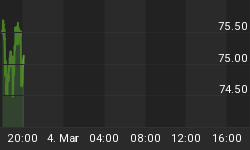Gold Ends Week 0.7% Lower, "Panic-Proof Protection" Advised as China's Dollar-Problem "Won't Go Away"
THE PRICE OF GOLD recovered one-half of Thursday's drop in London on Friday, heading into the close 0.7% down for the week as world stock markets held flat after yesterday's sharp losses and government bonds ticked higher.
The US Dollar was little altered, holding onto yesterday's 1.0% gain on the currency market.
The Gold Price in all other major currencies was next-to-unchanged from last week's finish.
"[Gold] is following the foreign exchange markets very closely," says MKS Finance, a division of the Swiss refining group, "remaining confined to the 920-950 range."
"We will become bullish if Gold is able to take out 943 on a [daily] close," says Scotia Mocatta in its technical analysis. "[Support at] the 100-day moving average at 927.50 seems to be holding."
Thursday saw the amount of Gold Bullion needed to back shares in the world's largest ETF, the SPDR Gold Trust listed in New York, stay unchanged for the week, holding 1% below the record of 1,134 tonnes reached on June 1st.
Gold sales in Abu Dhabi leapt 30% last month, Gulf Daily News reports, as expatriate workers - primarily from Asia - bought jewelry and small bars to take home as gifts during the local holiday-season.
Chinese wholesale gold demand meantime remained weak early Friday according to Ronald Leung of Lee Cheong Gold Dealers in Hong Kong.
"The market is likely to be dead with the US holiday and nothing new coming out of Europe," he told Reuters. "Investors are not in the market."
New data meanwhile showed gold imports to India - the world's hungriest gold market - falling 57% over the first half of 2009 from the same period last year.
Down to 59.8 tonnes in the first six months this year, India's gold imports have fallen by more than four-fifths from the peak of 2007.
"Once the monetary floodgates open and the velocity of money picks up again," writes analyst Ronald-Peter Stöferle at Austria's Erste Bank in a new 56-page report, "we might see a flight into real assets amid the inflationary environment.
"Commodities would generally benefit from such a scenario, and oil and gold in particular," says Stöferle, who first recommended Gold Investment to clients at $650 an ounce in 2006. "This is why we continue to recommend gold as a panic-proof component of your asset allocation and as long-term advisable way of protecting your purchasing power."
Next week sees political leaders from the G8 group of leading industrial nations meet in Italy, and "whether the subject of alternative reserve currencies [to the Dollar] is on the agenda or not, the issue won't go away," says Steven Barrow at Standard Bank today.
"The US Fed has essentially exported its loose monetary policy to the rest of the world. [But] successive US administrations have argued that the best way out of this problem is to have floating
currencies - starting with China."
Closely pegged to the US currency on a daily basis, the Chinese Renminbi - also known as the Yuan - has risen by 20% against the Dollar since the permitted trading band was widened in July 2005.
Yesterday the People's Bank of China took "another step" towards making the Yuan truly international, says the Financial Times, by allowing a small group of trading companies to bill and settle their invoices in the domestic currency, rather than in the US Dollar.
"To many minds in China, " says Stephen Green at Standard Chartered in Shanghai, "the US Dollar's time is almost up. The Eurozone suffers from political paralysis and a too-conservative central bank, while two decades of economic stagnation and a shrinking population do the Yen no favors."
Following yesterday's "no change" decision on Eurozone interest rates, new data today showed Retail Sales dropping 3.3% in May from the same month last.
The Baltic states of Lithuania and Latvia - both pegged to the Euro in anticipation of joining the currency zone - saw Retail Sales fall by one-fourth and one-fifth respectively.
In Japan - and after almost two "lost decades" of depression and debt deflation - consumer prices fell in May at their fastest pace on record.
"For [many people in China], the Renminbi is an obvious, and imminent, replacement" to the Dollar, says Standard Charter's Green.
Russian companies using the capital markets for finance have meantime raised more than twice as much debt in Roubles as in Dollar bonds so far this year, Bloomberg reports, as the domestic currency recovered one-half of late 2008's 35% devaluation.















